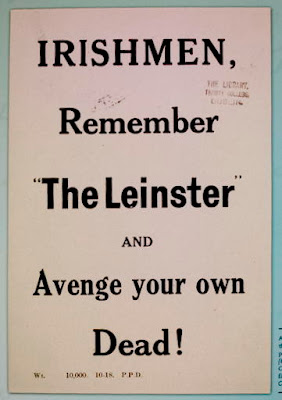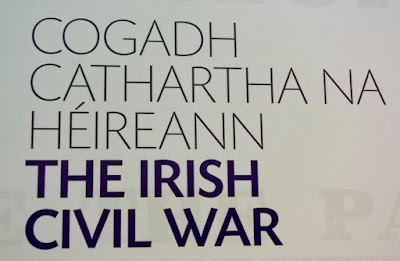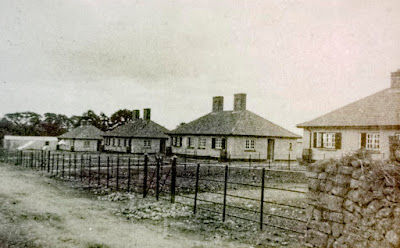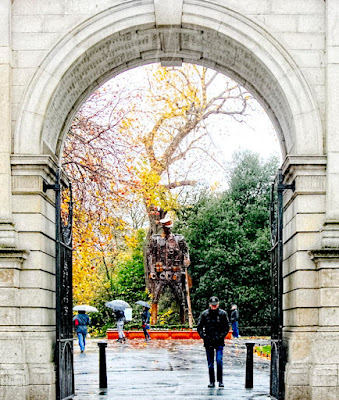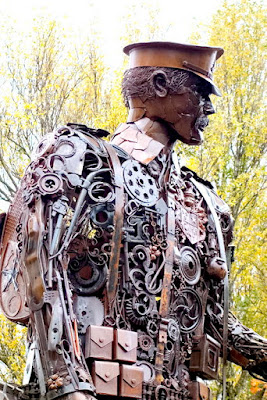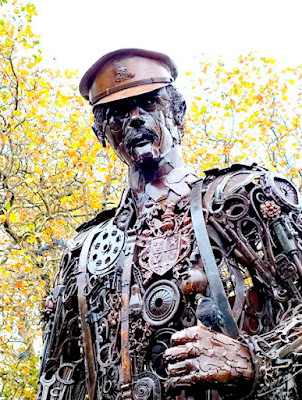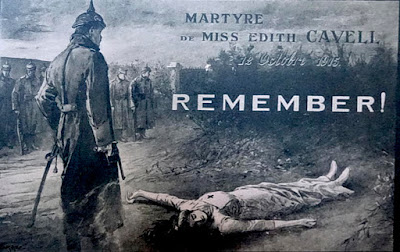Showing posts with label WWI. Show all posts
Showing posts with label WWI. Show all posts
Friday, November 09, 2018
AFTER THE WAR IS OVER ...
Another excellent exhibition at the Dublin City Library and Archive (DCLA) in Pearse St.
Lots to see and meditate on between panels and objects.
The exhibition covers the full period from the Armistice through the Civil War.
There is even a last gasp appeal for more cannon fodder in October 1918,
The War of Independence, started on the same day as the first sitting of the First Dáil.
Mass abstention from Westminster turned to positive ends.
Right through the tragedy of the Civil War.
Not forgetting the ravages of the flu as WWI drew to a close.
Efforts to find employment fo demobilised soldiers - those fortunate enough to come home.
And the slums we had always with us.
Video commentary - here housing returnees.
Thursday, November 08, 2018
THE HAUNTINGS SOLDIER
As I happened to be in town I thought I'd check out the big soldier in St. Stephen's Green.
It is a mighty work and well worth a visit, or pilgrimage if you prefer, before 30 November when he's due to depart.
This is a war-weary soldier returning from WWI. He is composed of all sorts of scrap metal with a few holes of light coming right through him.
The imagery is endless and powerful. There is a myriad of ways of looking at it. I see him as a victim, even though, unlike my uncle, he survived. But survived as what? Most returnees could not speak of where they had been. The horror was beyond all understanding.
Many returned in bits, with the bits barely held together.
This will give you an idea of the scale of the work.
Full marks to Sabina Purcell for organising the soldier coming to Dublin and being here for the centenary of Armistice Day. Sponsors are listed at the foot of the notice below.
It was pissing rain when I visited yesterday. I hope to go back again another day when it's dry and in different light, not just to take more photos but to repeat this very moving experience.
Well, I did get back, so here are some more angles.
Sunday, November 04, 2018
TANKS, NO THANKS
War poet Wilfred Owen died on this day one hundred years ago.
Below are some couplets in memory of my uncle, John Dwyer, a Private in the Civil Service Rifles, who died on the Somme, in the attack on High Wood, on 15 November 1916.
When he was 9 years of age, John won a book prize, presented to him by Padraig Pearse, at the Mayo Feis in 1903.
TANKS, NO THANKS
A day in September
A day to remember
From a prize at the Feis
To a tangled wire mesh
A new killing machine
For the first time was seen
Tanks were brought into play
Though not fit for the fray
General Barter had warned
His advice had been scorned
The big guns were silent
All over the salient
Then the tanks were let loose
Though they weren't fit for use
Infantry on their own
As the first tanks broke down
Other tanks went on fire
As the death toll climbed higher
Each tank that got lost
Had a high human cost
The attack on High Wood
Had a high cost in blood
As the soft bullets ripped
John's guts were unzipped
The remains of John Dwyer
Were lost in the mire.
Just a name on a wall
An imperial scrawl
Every death on the Somme
Resonated at home
A memorial card
Shrapnel's bitter-sweet shard
Bloody gentlemen all
In their rise and their fall
THANKS, NO TANKS
The corps commander overruled General Barter and insisted in deploying the tanks. This effectively resulted in depriving the infantry of artillery cover as the tanks proved more than useless in the event. In the subsequent witch-hunt General Barter was summarily relieved of his command. The General had earlier described the orders under which he was operating as "damned silly orders" which he, nevertheless, loyally carried out. The Official History eventually acknowledged this "tactical blunder". But by the time this vindication was published in 1938, Barter had been dead for seven years.
Labels:
1916,
General Barter,
High Wood,
John Dwyer,
Somme,
Wilfred Owen,
WWI
Friday, March 30, 2018
WOMEN AT WAR
The Dublin City Library and Archive (DCLA) in Pearse St. have been playing a blinder in recent times, actually over the last thirteen years or so since the tarting up and resourcing of the old (1909) Gilbert Library.
Between talks and exhibitions for the public at large and significant inputs into history research projects and publications, not to mention the archiving of material old and new, the place is a powerhouse of Dublin history.
The latest exhibition deals with women on the home front during WWI and it follows closely on a Suffragette exhibition, both of these making a significant contribution to countering the writing of women out of our glorious past.
So let's go in and have a look.
Needless to say, women started into the war in their "traditional" roles in society. They, no more than anyone else, had no idea of how their lives and future roles were to be eventually changed by this continental convulsion.
The exhibition traces the roles they played on the home front while many of their menfolk were away fighting for the King against the Kaiser.
Their activities at home were subsequently downplayed in the male history of the day, but the seeds that were sown in this period eventually grew up through the tangled undergrowth and today's world, had they seen it eventually come to pass, would surely have cheered them up.
I say that though, on reflection, I'm not sure that this would in fact be the case. There's still a long way to go.
This poster is typical of the use of women by the authorities to shame the men into going to war. Poor little (Catholic) Belgium is seen in flames with only a small area of sea between it and the home shore. Taken in tandem with other propaganda messages, this one appeals on more than one level.
What man would leave it up to his woman to go to war in is place? What will happen if the hated Bosch are not stopped? Next thing they'll be on the home shore and your family will be tortured and killed.
And if that didn't work, look at what the hated Bosch did to that lovely nurse Cavell.
I have to say I was familiar with Edith Cavell's name from having seen her statue in London many many years ago, but I had no idea that she had been executed for treason, of all things. That took me aback as she wasn't German. But apparently the Germans had conjured up a bespoke definition of treason which included helping the enemy no matter who you were, where you did it, or where you are from.
Would have saved a lot of paperwork in the case of Roger Casement. And him coming to mind brought up a British inconsistency that I must get to the bottom of sometime: they hanged Casement; shot the 1916 leaders; and refused to shoot Wolfe Tone. Funny old world.
But back to the women. On 9 June 1918, designated as Lá na mBan, and in the days following, thousands of women all over the country signed an anti-conscription pledge where, as well as indicating their opposition to conscription, they undertook not to do any of the work left undone by the men should these be conscripted.
Granted, this was well into the war and, unlike at the begining, its effects were being felt and such glory as there might have been at the beginning had dissipated. Then there had also been the Rising and its consequences.
So the poster above stands in stark contrast to that further up above which attempted to use women to leverage the men to join up.
However, a lot of men had joined up. Some for idealistic reasons, little Belgium and all that. But others had joined for a steady income for their family. And yet others had been suckered into volunteering at the end of a late night's drinking in the pub.
I'm told my grand-uncle, John Burgess, was in the last of the above categories. His joining up didn't make a lot of sense. He was married with at least two and a half children; he was well fixed working in his father's successful shoemaking business which he was about to inherit on his father's impending retirement.
When he enlisted, his father evicted his wife and children from the "company house" in Kilmainham and banished them to a wee box house across the river on Oxmantown Road. I'd say she well needed the separation women's allowance at that stage.
The allowance, which was paid to women whose men had enlisted, evoked many reactions on the home front. The Republican movement opposed the allowance on the grounds, inter alia, that it was irresponsibly squandered by the recipients.
There was mention of drunkeness, idleness and loose morals and the National Union of Women Workers established Irish Women's Patrols, reminiscent of the rural Parish Priest with his shillelagh scouring the ditches for misbehaving couples.
Cumann na mBan were active throughout this period and the exhibition features a book of poetry from Maeve Cavanagh, Sheaves of Revolt, which decried the enlistment of Irishmen into the British Army, was stridently anti-British and was suppressed by the authorities.
Maeve was the sister of Ernest Cavanagh who did memorable cartoons for Jim Larkin's Irish Worker. He was shot on the steps of Liberty Hall during the Rising.
A fine picture of Kathleen Clarke, widow of Tom Clarke, who was a founder member of Cumann na mBan and who served on the City Council with my grand-uncle PJ Medlar, finally knocking Alfie Byrne off his pedestal in 1939 to become the first female Lord Mayor of Dublin City, and that in an election in which Alfie actually cast two votes for her.
When my friend, Felix Larkin, pointed out this wonderful electoral anomaly to me, it reminded me that Albert Reynolds had signed the articles establishing the European Bank for Reconstruction (EBRD) twice and my grandfather signed his 1901 census form twice - all legit and by the book.
An unusual photo of Constance Markievicz, far right. Founder member of Cumann na mBan, sentenced to death for her part in the Rising, first woman elected to the British House of Commons and first woman in the world to become a Cabinet Minister.
Monica Roberts was a young woman who set up a voluntary organization, ‘The Band of Helpers to the Soldiers’ to provide gifts for Irish troops at the front, particularly those serving with the Royal Dublin Fusiliers and the Royal Flying Corps.
Many soldiers wrote to thank Monica and a correspondence then developed. These poignant letters give vivid pen-pictures of conditions at the Western Front and reveal the courage of troops in the face of appalling circumstances.
An ID certificate issued in London with a permit for Monica to travel (return to) Ireland within three months.
A general observation about the exhibition. This is one of a number of recent exhibitions drawing on archives and collections held by the DCLA, including some only recently acquired - Dublin Fusiliers, Jacobs Biscuits, Monica Roberts.
Senior Archivist Ellen Murphy has responsibility for these archives and for this and recent exhibitions. She is doing a marvellous job both behind the scenes in sorting out the archives and then organising their presentation in the exhibitions.
The current exhibition draws on the three archives mentioned and it is encouraging to see how these sources complement each other and contribute to building up a wider picture. Ellen's head must be filling up at a rate of knots of late but it is all grist to the mill.
While I'm at it I'd like to congratulate Monica in the Council's Irish Language Unit on her recent promotion. I have commented on her creative use of the Irish language both in the Jacobs and in the current exhibition. Her good fortune will be the Unit's loss.
Friday, November 18, 2016
TOM KETTLE
There are a few things to be said about St. Mary's church, Haddington Rd.
It is a beautiful church.
It is the only Roman Catholic church in Dublin, and perhaps in the country, that has a quality plaque on the wall commemorating parishioners who died in WWI. We are used to seeing a profusion of these in Protestant churches but this is different.
The church is also host to a series of very high quality lectures, sometimes on church related topics and sometimes less so. They are part of the "Patrick Finn Lecture Series", so named after the, now sadly deceased, enlightened Parish Priest who instituted them.
Tonight (17/11/2016), it was fitting that the talk was about Tom Kettle, who was one of those parishioners who fell at the Somme on 9 September 1916.
And it was also fitting that the talk was given by Maurice Manning, who, incidentally, was one of my tutors in UCD in the 1960s. I have him to thank for giving me access to what was then a restricted access book by Paul Blanchard. Thanks Maurice.
Maurice has a deep understanding of, and empathy with, the history of this country, and in the course of his talk he also demonstrated a nuanced appreciation of this complicated man, Tom Kettle.
There is a fine bust of Kettle in St. Stephen's Green and that is where I first came across him many years ago. I didn't really know anything about him but assumed he was one of our heroes as a result of something or other. In fact, there was very little talk about him since until more recent times when the country started having to come to terms with the twin legacies of the 1916 Rising and WWI.
I am very aware of this as I was brought up on the Rising only to find, in more recent times, that I had an uncle killed on the Somme in the same year as the Rising.
It is this ambiguity that plagued Kettle in the final years of his life. He was essentially a nationalist and had been sent to Belgium to buy guns for the Volunteers. But the German atrocities he saw there convinced him that there was a wider cause to be supported if civilisation was to be preserved, and this is what motivated him to join the British army.
Initially denied the chance to go to the front, for health reasons, he embarked on an intensive campaign of recruiting for the British Army on the home front. For this he was frequently vilified and on one occasion badly beaten up.
He was jeered at for asking others to do what he himself did not, and this stung. So much so that, despite his abhorrence at the British reaction to the Rising, he contrived to get to the Western Front, and died in this, to him, greater cause.
He did his best not to be misunderstood and, as a result we have as part of his legacy, his poem explaining himself to his newly born daughter at home.
The final lines of the poem have by now become a cliché, but Maurice made the point that the earlier lines are a thing of beauty and to prove it he read the whole poem.
To My Daughter Betty, The Gift of God
by Thomas Michael Kettle
dated ‘In the field, before Guillemont, Somme, Sept. 4, 1916’.
In wiser days, my darling rosebud, blown
To beauty proud as was your mother's prime,
In that desired, delayed, incredible time,
You'll ask why I abandoned you, my own,
And the dear heart that was your baby throne,
To dice with death. And oh! they'll give you rhyme
And reason: some will call the thing sublime,
And some decry it in a knowing tone.
So here, while the mad guns curse overhead,
And tired men sigh with mud for couch and floor,
Know that we fools, now with the foolish dead,
Died not for flag, nor King, nor Emperor,—
But for a dream, born in a herdsman's shed,
And for the secret Scripture of the poor.
As to the rest of his personal life and his career. He was apparently both brilliant and good company. He became professor of political economy at UCD, a component college of the newly established National University. He didn't necessarily know any much economics but had an enquiring mind and an enthusiasm that inspired his students.
He became an MP in the UK parliament but found that a bore. He mixed in London intellectual and literary circles. And then he took to the drink which sadly crucified him and his wife Mary from there on in. This flower of Irish youth was reduced to a serial promiser to quit the booze, again. So sad, and a part of his life that has been downplayed by the nationalist tradition. But it was part of him, and Maurice faced it full on. But he also reminded us that he rose above it, hence the quotation of the full poem.
So let us honour him in his full complexity and that of the times he lived in.
Subscribe to:
Posts (Atom)




